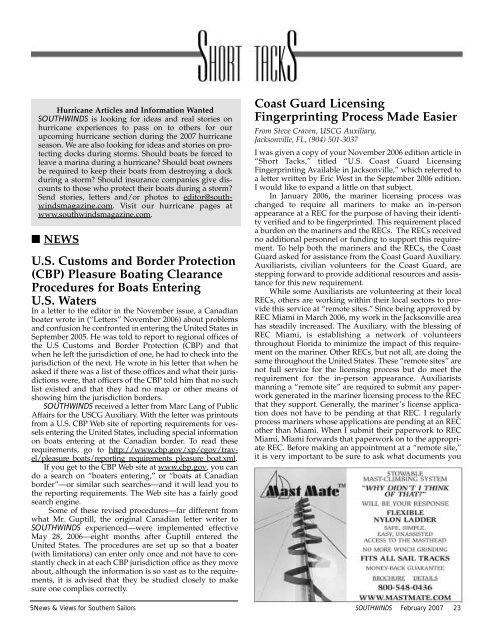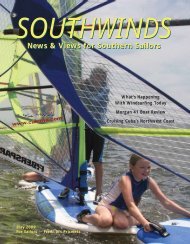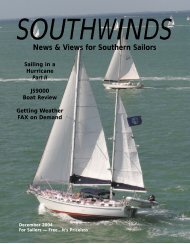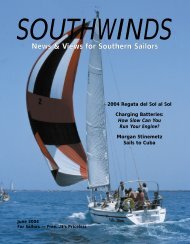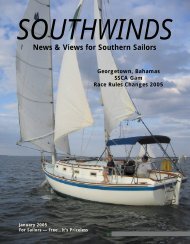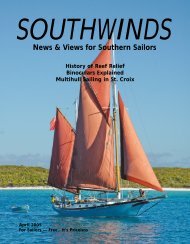Read PDF - Southwinds Magazine
Read PDF - Southwinds Magazine
Read PDF - Southwinds Magazine
Create successful ePaper yourself
Turn your PDF publications into a flip-book with our unique Google optimized e-Paper software.
Hurricane Articles and Information Wanted<br />
SOUTHWINDS is looking for ideas and real stories on<br />
hurricane experiences to pass on to others for our<br />
upcoming hurricane section during the 2007 hurricane<br />
season. We are also looking for ideas and stories on protecting<br />
docks during storms. Should boats be forced to<br />
leave a marina during a hurricane Should boat owners<br />
be required to keep their boats from destroying a dock<br />
during a storm Should insurance companies give discounts<br />
to those who protect their boats during a storm<br />
Send stories, letters and/or photos to editor@southwindsmagazine.com.<br />
Visit our hurricane pages at<br />
www.southwindsmagazine.com.<br />
■ NEWS<br />
U.S. Customs and Border Protection<br />
(CBP) Pleasure Boating Clearance<br />
Procedures for Boats Entering<br />
U.S. Waters<br />
In a letter to the editor in the November issue, a Canadian<br />
boater wrote in (“Letters” November 2006) about problems<br />
and confusion he confronted in entering the United States in<br />
September 2005. He was told to report to regional offices of<br />
the U.S Customs and Border Protection (CBP) and that<br />
when he left the jurisdiction of one, he had to check into the<br />
jurisdiction of the next. He wrote in his letter that when he<br />
asked if there was a list of these offices and what their jurisdictions<br />
were, that officers of the CBP told him that no such<br />
list existed and that they had no map or other means of<br />
showing him the jurisdiction borders.<br />
SOUTHWINDS received a letter from Marc Lang of Public<br />
Affairs for the USCG Auxiliary. With the letter was printouts<br />
from a U.S. CBP Web site of reporting requirements for vessels<br />
entering the United States, including special information<br />
on boats entering at the Canadian border. To read these<br />
requirements, go to http://www.cbp.gov/xp/cgov/travel/pleasure_boats/reporting_requirements_pleasure_boat.xml.<br />
If you get to the CBP Web site at www.cbp.gov, you can<br />
do a search on “boaters entering,” or “boats at Canadian<br />
border”—or similar such searches—and it will lead you to<br />
the reporting requirements. The Web site has a fairly good<br />
search engine.<br />
Some of these revised procedures—far different from<br />
what Mr. Guptill, the original Canadian letter writer to<br />
SOUTHWINDS experienced—were implemented effective<br />
May 28, 2006—eight months after Guptill entered the<br />
United States. The procedures are set up so that a boater<br />
(with limitations) can enter only once and not have to constantly<br />
check in at each CBP jurisdiction office as they move<br />
about, although the information is so vast as to the requirements,<br />
it is advised that they be studied closely to make<br />
sure one complies correctly.<br />
Coast Guard Licensing<br />
Fingerprinting Process Made Easier<br />
From Steve Craven, USCG Auxiliary,<br />
Jacksonville, FL, (904) 501-3037<br />
I was given a copy of your November 2006 edition article in<br />
“Short Tacks,” titled “U.S. Coast Guard Licensing<br />
Fingerprinting Available in Jacksonville,” which referred to<br />
a letter written by Eric West in the September 2006 edition.<br />
I would like to expand a little on that subject.<br />
In January 2006, the mariner licensing process was<br />
changed to require all mariners to make an in-person<br />
appearance at a REC for the purpose of having their identity<br />
verified and to be fingerprinted. This requirement placed<br />
a burden on the mariners and the RECs. The RECs received<br />
no additional personnel or funding to support this requirement.<br />
To help both the mariners and the RECs, the Coast<br />
Guard asked for assistance from the Coast Guard Auxiliary.<br />
Auxiliarists, civilian volunteers for the Coast Guard, are<br />
stepping forward to provide additional resources and assistance<br />
for this new requirement.<br />
While some Auxiliarists are volunteering at their local<br />
RECs, others are working within their local sectors to provide<br />
this service at “remote sites.” Since being approved by<br />
REC Miami in March 2006, my work in the Jacksonville area<br />
has steadily increased. The Auxiliary, with the blessing of<br />
REC Miami, is establishing a network of volunteers<br />
throughout Florida to minimize the impact of this requirement<br />
on the mariner. Other RECs, but not all, are doing the<br />
same throughout the United States. These “remote sites” are<br />
not full service for the licensing process but do meet the<br />
requirement for the in-person appearance. Auxiliarists<br />
manning a “remote site” are required to submit any paperwork<br />
generated in the mariner licensing process to the REC<br />
that they support. Generally, the mariner’s license application<br />
does not have to be pending at that REC. I regularly<br />
process mariners whose applications are pending at an REC<br />
other than Miami. When I submit their paperwork to REC<br />
Miami, Miami forwards that paperwork on to the appropriate<br />
REC. Before making an appointment at a “remote site,”<br />
it is very important to be sure to ask what documents you<br />
5News & Views for Southern Sailors SOUTHWINDS February 2007 23


